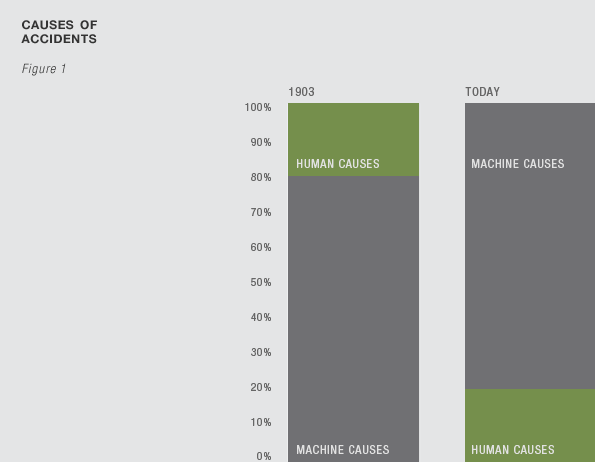
EFFECT OF REDUCING MAINTENANCE ERRORS
The 2003 International Air Transport Association (IATA) Safety Report found that in 24 of 93 accidents (26 percent), a maintenance-caused event started the accident chain. Overall, humans are the largest cause of all airplane accidents (see fig. 1).
Maintenance errors can also have a significant effect on airline operating costs. It is estimated that maintenance errors cause:
- 20 to 30 percent of engine in-flight shutdowns at a cost of US$500,000 per shutdown.
- 50 percent of flight delays due to engine problems at a cost of US$9,000 per hour.
- 50 percent of flight cancellations due to engine problems at a cost of US$66,000 per cancellation.
More than 500 aircraft maintenance organizations are currently using MEDA to drive down maintenance errors. One airline reported a 16 percent reduction in maintenance delays. Another airline was able to cut operationally significant events by 48 percent. Many other operators have reported specific improvements to their internal policies, processes, and procedures.

MEDA OVERVIEW
MEDA provides operators with a basic five-step process to follow:
- Event.
- Decision.
- Investigation.
- Prevention strategies.
- Feedback.
Event. An event occurs, such as a gate return or air turnback. It is the responsibility of the maintenance organization to select the error-caused events that will be investigated.
Decision. After fixing the problem and returning the airplane to service, the operator makes a decision: Was the event maintenance-related? If yes, the operator performs a MEDA investigation.
Investigation. The operator carries out an investigation using the MEDA results form. The trained investigator uses the form to record general information about the airplane, including when the maintenance and the event occurred, the event that began the investigation, the error and/or violation that caused the event, the factors contributing to the error or violation, and a list of possible prevention strategies.
Prevention strategies. The operator reviews, prioritizes, implements, and then tracks prevention strategies (i.e., process improvements) in order to avoid or reduce the likelihood of similar errors in the future.
Feedback. The operator provides feedback to the maintenance workforce so technicians know that changes have been made to the maintenance system as a result of the MEDA process. The operator is responsible for affirming the effectiveness of employees' participation and validating their contribution to the MEDA process by sharing investigation results with them.
The resolve of management at the maintenance operation is key to successful MEDA implementation. Specifically, after completing a program of MEDA support from Boeing, managers must assume responsibility for the following activities before starting investigations:
- Appoint a manager in charge of MEDA and assign a focal organization.
- Decide which events will initiate investigations.
- Establish a plan for conducting and tracking investigations.
- Assemble a team to decide which prevention strategies to implement.
- Inform the maintenance and engineering workforce about MEDA before implementation.
